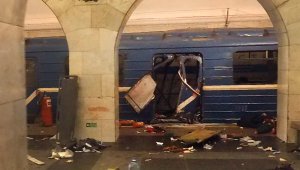The St. Petersburg metro attack was carried out by a suicide bomber, the Kyrgyz Foreign Minister has said.

Kyrgyz authorities had earlier identified Akbarjon Djalilov, a Russian national born in Kyrgyzstan, as a suspect in the blast that ripped through a train in Russia’s second city on Monday afternoon.
The Russian health ministry raised the number of dead from 11 to 14, although it was unclear whether that included the attacker. Four of the dozens of people injured are in critical condition, Health Minister Veronika Skvortsova said, according to TASS.
Russians laid flowers and tributes at memorials and a three-day period of mourning has begun.
Latest developments
A three-day mourning period for the victims has begun. Four people remain in critical condition, the Health Minister said. Russian President Putin held a meeting with security and law-enforcement services. Putin laid roses at one of the memorials Tuesday. Some metro stations are reopening after a complete network shutdown.
The explosion took place between the Sennaya Ploshchad and Tekhnologichesky Institut stations at about 2.40 p.m. on Monday. Photographs from the scene showed bandaged and bloodied bodies being carried from the station where the train came to a stop.
Others showed bodies lying by the train itself at Tekhnologichesky Institut as the station filled with smoke.
A second, larger device was found and defused at another station, Russia’s Anti-Terrorism Committee said.
That device, hidden in a fire extinguisher, was larger than the one that exploded, according to state media reports that quoted law enforcement sources. It carried about a kilogram of TNT, the reports said.
Train driver praised
The driver of the train, Alexander Kaverin, has been praised in Russia for continuing to the next station after the blast, ensurin a quick evacuation of passengers.
“At that moment there was no question of fear. It was just a question of working, rolling up your sleeves,” he said.
“I just acted according to instructions, because we have instructions worked out especially for such cases. We have had explosions before and I think these instructions are very clever, very correct.”
Kyrgyzstan connection
No group has claimed responsibility for the attack, which led to the shutdown of the city’s metro system. Russian Prime Minister Dmitry Medvedev described it as a “terrorist act.”
Erlan Abyldaev, the Kyrgyz Foreign Minister, said the bomber’s motives were unclear.
“Regarding the link with Islamic radicalism, we have to wait to know more until the investigation yields its full results,” Abyldaev said at a press conference with Russian Foreign Minister Sergey Lavrov.
Kyrgyzstan is a Muslim-majority nation in Central Asia of around six million people. It is formerly part of the Soviet Union and remains a close ally of Russia.
Russian President Vladimir Putin was in St. Petersburg for a media conference the morning of the attack. At a press conference Tuesday, reporters asked Kremlin spokesman Peskov whether he thought the President may have been a target.
“Of course the fact that the terror attack happened when the head of the state was in town is a food for thought and is subject to analysis by the special services. Any terror attack that happens in the country is an attack on every single Russian citizen. Including the head of state,” he said.
Analysts have speculated that the bomber could be affiliated with either a Chechen separatist group or ISIS. The bombing of a Russian MetroJet flight over the Sinai desert in Egypt, which killed all 224 people aboard, was claimed by ISIS
Another possibility, says former CNN Moscow Bureau Chief and Woodrow Wilson Center Global Fellow Jill Dougherty, is a hybrid Chechen rebel-ISIS attack.
Many Chechen fighters have gone to fight in Syria, she said, and it has long been feared that they could bring their battlefield expertise back home.
“The fear was that after (Chechens) had been radicalized and almost professionalized, by that time in Syria would then come home and carry out attacks in Russia … (which) would fit the kind of ISIS international terrorism theory that Putin has been talking about,” she said.
“It makes it easier for him to make that proposal… to President Trump and the West — ‘let’s get on board, lets fight terrorism together.'”
However, former FBI special agent Bobby Chacon says that to stay silent after an attack goes against the ISIS modus operandi.
“The first thing that’s missing from an investigator’s perspective is the claim of responsibility,” he told CNN.
“Last year when two ISIS operatives attacked police officers on the outskirts of Moscow… one of the first things that was released was the video where they claimed allegiance to al Baghdadi, the ISIS leader and ISIS itself and that’s a hallmark, as we’ve seen in San Bernardino, of an ISIS attack.”
Russia was once a hotspot for terror attacks, but the country has experienced relatively few in recent years.
In December 2013, a suicide bombing at a train station in Volgograd killed at least 16 people. The following day, in the same city, a suicide bombing on a trolley bus killed 14 people.
In 2010, two female suicide bombers linked to the Chechen insurgency blew themselves up at two Moscow metro stations, killing 40. In 2002, Chechen rebels killed 170 hostages in a theater in the capital, Moscow.




